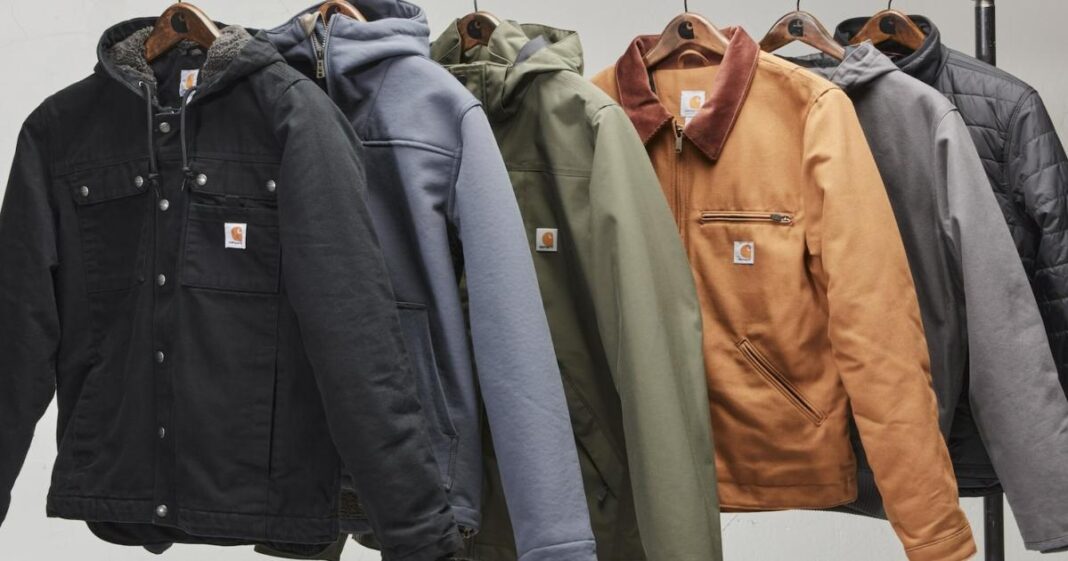Carhartt last week expanded its resale program to accept worn merchandise by mail in exchange for store credit throughout the United States. The Carhartt Reworked program has accepted trade-ins at 35 stores since July, after launching as a pilot in early 2023.
The jacket and workwear maker is hoping to increase its share of the growing market for secondhand gear and solidify its reputation for sustainability.
The resale market reached $1 billion in revenues in 2022 and could make up nearly a quarter of all fashion sales by 2027, according to the Ellen MacArthur Foundation.
“From the company’s beginnings, we’ve used top-notch materials and the finest craftsmanship to create gear that’s durable and takes a considerable amount of time to wear out,” Gretchen Valade, Carhartt’s director of sustainability, said via email. “With a focus on circularity services and sustainability throughout the organization, and given our position within the industry, we wanted to find a way to lean into the durability of our products.”
The Dearborn, Michigan, company projects a blend of blue-collar, “hardworking” durability with pop-star chic. It began by selling overalls to late-19th-century railroad workers, and its Carhartt Chore Coat has barely changed since World War I. Hip-hop stars embraced the company’s “C” logo on jackets and knit caps in the 1980s and 1990s. In recent years the brand’s products have appeared in paparazzi photos of celebrities.
Carhartt Reworked is the first major entry by a workwear brand into formal, branded resale.
Carharrt does not disclose emissions or have an extensive sustainability report. The company remains privately held by descendants of the founder, Hamilton Carhartt.
However, the 5,500-person business reduced its paper usage by 43 percent after adopting the brand and retail standards of the Higg Index, in 2021. The Higg Index is a program that measures and improves a company’s environmental performance, run by Cascale (formerly the Sustainable Apparel Coalition).
Where Carhartt fits versus its rivals
Carhartt Reworked is the first major entry by a workwear brand into formal, branded resale, a space currently dominated by higher-end labels such as Chanel and Coach and outdoor brands such as Patagonia and REI.
By contrast, VF Corporation’s cargo pant and coverall maker Dickies lacks a resale marketplace. Among apparel companies selling durable pants and jackets, the closest comparison to Carhartt Reworked may be the Levi’s Secondhand used-jeans website, which launched in 2020 and also uses Trove for back-end operations. Wrangler, owned by VF Corporation spinoff Kontoor Brands, only had a short-lived Wrangler Reborn online shop in 2022 to mark its 75th anniversary with sales of 1950s and newer denim.
Shortly after launching Carhartt Reworked, it became evident that the loyalty ingrained within Carhartt’s customer base extended seamlessly to the program, Valade said.

The process and the rejects
On the front end of the Carhartt Reworked website, consumers begin by entering a product number from the unwanted garment’s care tag. Then they can ship or bring qualifying items to one of 46 stores in exchange for a Carhartt gift card to buy either new or pre-worn goods.
Jackets, overalls, sweatshirts, pants and jeans in good condition are acceptable for trade-in if they originally cost $50 or more and were made in the past decade.
Items that are stained, smelly or altered are unwelcome, however. Jeans that can’t be resold, donated or repaired may go into the Blue Jeans Go Green recycling program, run by industry group Cotton Inc.
Behind the scenes
Carharrt Reworked’s resale operations — reverse-logistics, online resale storefront, and five warehouses — are being run by Trove, which says it handles more than two-thirds of the U.S. branded apparel resale market. It has raised $150 million in venture capital funding since launching in 2012 as a peer-to-peer startup.
The 100-person company is based in Brisbane, California. Among its 12 clients are Patagonia, REI, Eileen Fisher and Lululemon. Last year it prevented 4.4 million pounds of carbon emissions and kept nearly 440,000 pounds of waste out of landfills, Trove said.
This is the biggest lever that brands have to decarbonize their business.
“We’re consumers at heart, and that’s why we’re such big fans of the circular business model, because we believe that that still enables a level of retail activity, which is sustainable,” Trove CEO Gayle Tait told GreenBiz.
In addition to reducing the emissions from manufacturing new apparel, companies that offer resale can reduce their need to produce new items by up to 35 percent, according to Trove.
“This is the biggest lever that brands have to decarbonize their business,” Tait said.
Carhartt’s other sustainability offerings include its “Built To Last” commitment, which offers repairs for things like lost buttons or torn zippers. The Reworked website details repair options including in-person help at stores in Chicago and Murray, Utah, as well as mail-in repairs and DIY patch kits.
